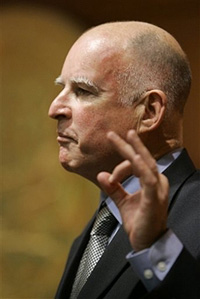 |
 |
 |
 Editorials | Environmental | April 2007 Editorials | Environmental | April 2007  
Court Rebukes Administration in Global Warming Case
 Reuters Reuters


| | California Attorney General Jerry Brown gestures while commenting on the U.S. Supreme Court's decision that affects global warming at a news conference in San Francisco, Monday, April 2, 2007. (AP/Eric Risberg) |
Washington - In a defeat for the Bush administration, the Supreme Court ruled Monday that a U.S. government agency has the power under the clean air law to regulate greenhouse gas emissions that spur global warming.

The nation's highest court by a 5-4 vote said the Environmental Protection Agency "has offered no reasoned explanation" for its refusal to regulate carbon dioxide and other emissions from new cars and trucks that contribute to climate change.

The ruling came in one of the most important environmental cases to reach the Supreme Court in decades. It marked the first high court decision in a case involving global warming.

Greenhouse gases occur naturally and are also emitted by cars, trucks and factories into the atmosphere. They can trap heat close to the earth's surface like the glass walls of a greenhouse.

Such emissions have risen steeply over the past century and many scientists see a connection between this rise and an increase in global average temperatures and a related increase in extreme weather, wildfires, melting glaciers and other damage to the environment.

Justice John Paul Stevens, writing for the court majority, rejected the administration's argument that it lacked the power to regulate such emissions. He said the EPA's decision was "arbitrary, capricious or otherwise not in accordance with law."

In sending the case back for further proceedings, Stevens said the high court did not decide which policy the EPA must follow. "We hold only that EPA must ground its reasons for action or inaction in the statute," he wrote.

The Bush administration has consistently rejected capping greenhouse gas emissions as bad for business and U.S. workers.

The court's four most conservative members - Chief Justice John Roberts and Justice Samuel Alito, both appointees of President Bush, and Justices Antonin Scalia and Clarence Thomas - dissented. | 
 | |
 |



